
The workplace in 2025 has shifted towards AI-powered platforms that unify tools, automate workflows, and improve decision-making. These platforms reduce inefficiencies, enhance collaboration, and ensure compliance, making them essential for businesses aiming to stay competitive. Here's a quick look at the top AI platforms transforming workplaces:
Key Features to Consider:
| Platform | Model Interoperability | Integration Capabilities | Governance & Compliance | Cost Transparency | Scalability |
|---|---|---|---|---|---|
| Prompts.ai | 35+ AI models | Strong API connectivity | Enterprise-grade | Pay-as-you-go (TOKN) | High |
| Lindy.ai | Limited | Secure connections | Basic compliance | Moderate | Medium |
| Domo | Analytics-focused | Extensive data connectors | Strong governance | Subscription-based | High |
| UiPath | RPA-focused models | Enterprise-level | Comprehensive compliance | Tiered pricing | Very High |
| Automation Anywhere | Bot-specific AI | Wide application support | Strong security | Tiered pricing | High |
| Relevance AI | Flexible ML models | API-first approach | Standard compliance | Usage-based pricing | Medium |
| Relay.app | Basic AI integration | Team-focused connectors | Workflow governance | Transparent pricing | Medium |
| VectorShift | LLM guardrails | Secure integrations | SOC 2, HIPAA compliance | Enterprise pricing | Very High |
Choose the platform that aligns with your business goals, whether it's cost efficiency, advanced automation, or strict security.
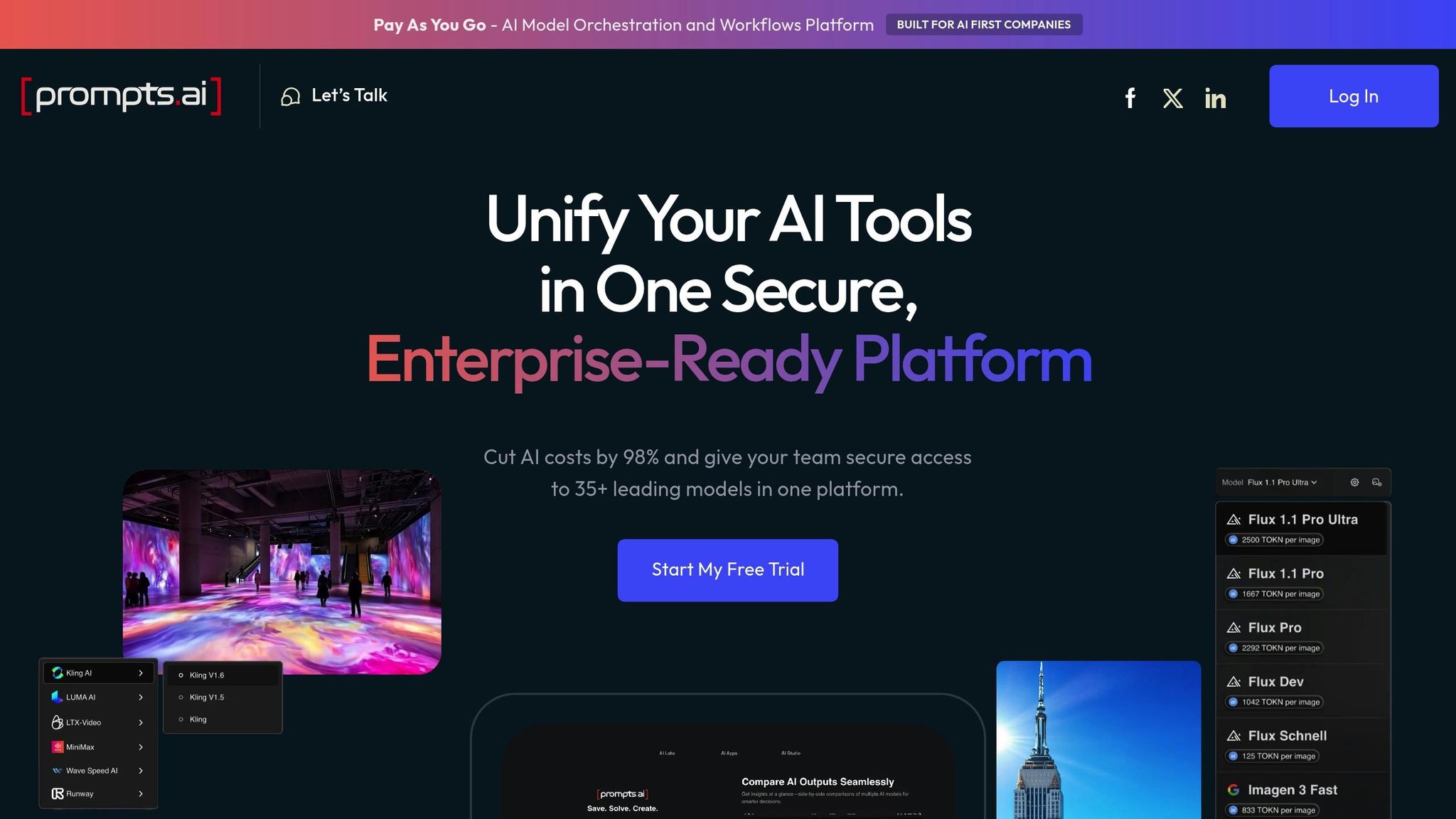
Prompts.ai positions itself as a powerful AI orchestration platform designed to tackle the key challenges businesses face in 2025. Instead of requiring teams to manage a patchwork of AI tools and subscriptions, this enterprise-grade solution brings over 35 leading large language models - including GPT-5, Claude, LLaMA, and Gemini - into one secure and unified interface.
By addressing the inefficiency of maintaining separate AI tools, Prompts.ai ensures teams can focus on productivity. Its centralized platform eliminates the hassle of juggling multiple subscriptions, helping businesses streamline their AI workflows.
One of Prompts.ai's standout features is its ability to seamlessly connect various AI models within a single workflow. Teams can switch between GPT-5, Claude, Gemini, and others without the need for retraining, thanks to its model-agnostic design. This flexibility ensures businesses are not locked into a single provider's ecosystem.
The platform also offers side-by-side performance comparisons, enabling teams to identify the best model for a specific task. For instance, one model might excel at content creation, while another is better suited for data analysis - both can be used within the same project. This interoperability makes it easy to integrate the platform into existing systems, enhancing efficiency across diverse workflows.
Prompts.ai is built to work seamlessly with existing enterprise systems, minimizing the challenges often associated with adopting new AI tools. It connects with widely-used business tools and integrates smoothly into established workflows, ensuring minimal disruption.
Teams can continue using their preferred project management software, communication platforms, and data sources while leveraging AI capabilities through familiar interfaces. This compatibility reduces the learning curve and enhances productivity.
To address the compliance concerns that often hinder AI adoption, Prompts.ai includes robust governance features. It provides detailed audit trails for every interaction, tracking model usage, prompts, and user activity.
Data security is a top priority, with the platform ensuring that all sensitive information remains under the organization’s control. This is particularly beneficial for industries with strict data handling requirements, as it simplifies compliance documentation and supports regulatory adherence.
Prompts.ai incorporates a built-in FinOps layer that offers real-time, token-level cost tracking linked to business outcomes. This detailed insight helps organizations measure their AI return on investment and adjust spending as needed.
The platform operates on a pay-as-you-go model using TOKN credits, eliminating the recurring subscription fees that typically pile up when managing separate AI tools. Companies using Prompts.ai have reported cost savings of up to 98%, making it an economically smart choice for consolidating AI resources.
Designed for growth, Prompts.ai’s architecture allows businesses to scale quickly, adding new models, users, and teams in minutes rather than weeks. This flexibility is essential for companies experiencing rapid expansion or seasonal spikes in AI usage.

Lindy.ai specializes in creating digital assistants designed to handle routine tasks efficiently while keeping human oversight intact.
Lindy.ai connects effortlessly with existing business tools through its well-developed ecosystem. Its permission system ensures secure connections and controls over data access, allowing teams to incorporate AI agents into their daily workflows without disruption. This smooth integration is backed by rigorous data protection protocols.
Security and compliance are central to Lindy.ai's platform. It holds SOC 2 Type II certification, verified by Johanson Group, which confirms the effectiveness of its security measures. For healthcare providers, Lindy.ai complies with HIPAA regulations, ensuring the protection of Protected Health Information - a feature trusted by numerous U.S. clinics. The platform also adheres to global standards like GDPR and PIPEDA. Data is safeguarded with AES-256 encryption for storage and TLS 1.2+ for secure transmission.
With its solid integration and compliance foundation, Lindy.ai offers secure and reliable scalability. Hosted on Google Cloud Platform, the system benefits from multi-zone redundancy, automated security updates, and tightly controlled cloud storage access. Business continuity is ensured through features like automated failover systems and disaster recovery plans spanning multiple data center regions. Additional security measures, including Role-Based Access Control, multi-factor authentication, and automated account provisioning and deprovisioning, make it easy for organizations to scale securely as they grow.
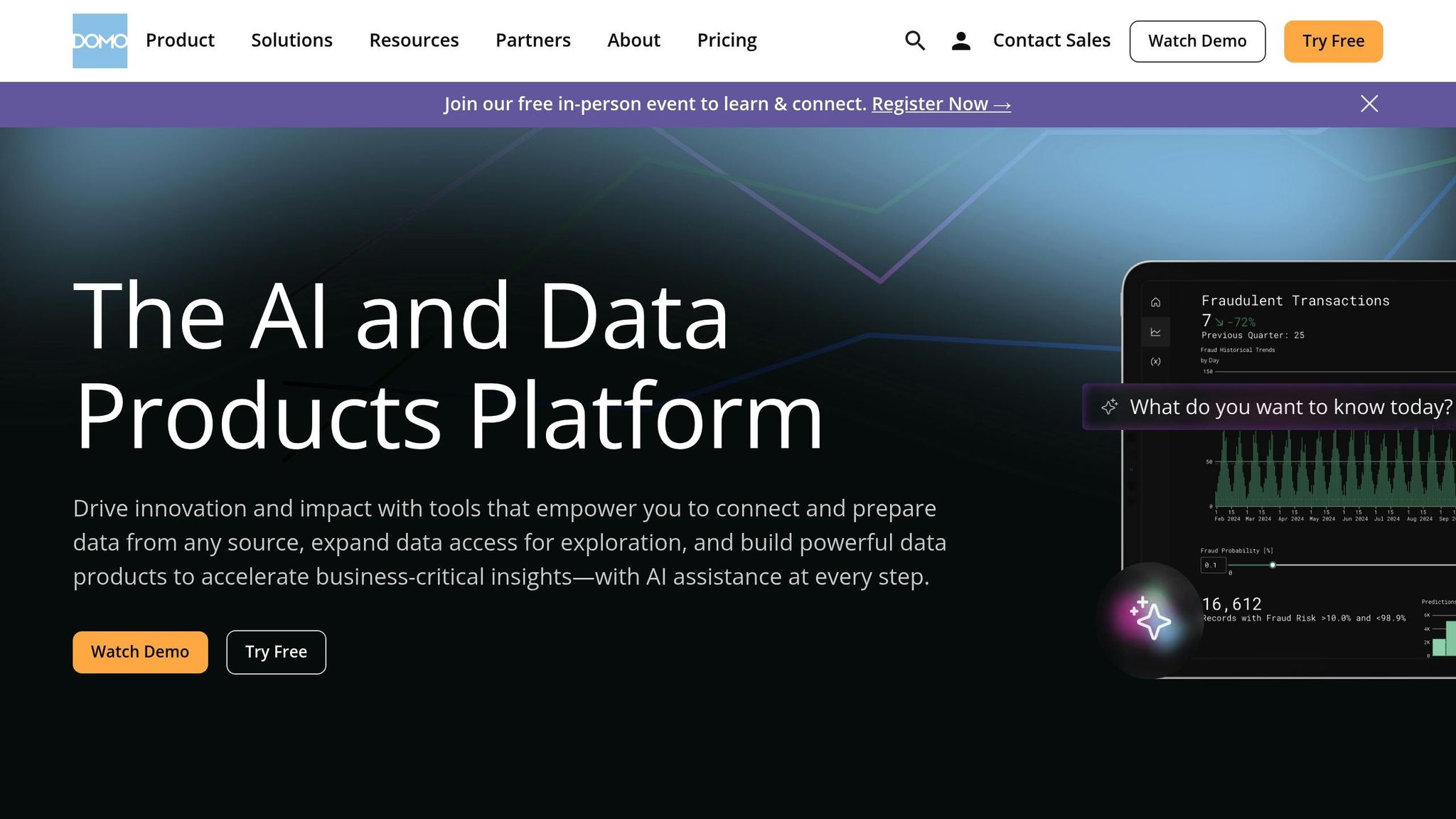
Domo offers a comprehensive approach to data management, transforming raw data into meaningful insights through its cloud-native business intelligence (BI) platform. Its emphasis on interoperability and efficient workflows makes it a standout choice for organizations seeking streamlined data solutions.
One of Domo's key strengths is its ability to connect with a wide range of data sources. This enables businesses to centralize their data and simplify processes. With real-time processing, Domo provides immediate insights into changing business conditions, helping teams stay agile. The platform also incorporates strong data governance, ensuring that integration is both smooth and secure.
Domo takes data security seriously, offering features like role-based access controls and detailed audit trails. These tools allow organizations to manage data at a granular level while safeguarding sensitive information. By supporting secure collaboration, Domo fosters a data-driven culture within organizations without compromising on compliance.
Domo operates on a subscription-based pricing model that adapts to the needs of the business. While the pricing is clear and flexible, organizations should be aware that costs may rise as they expand the use of advanced analytics or onboard more users.
Built on a cloud-native framework, Domo is designed to grow alongside your business. Its architecture adjusts processing power as needed, ensuring reliable performance even during peak usage. Whether data volumes increase or user demands grow, Domo maintains fast query responses and consistent functionality, making it an ideal solution for scaling businesses.
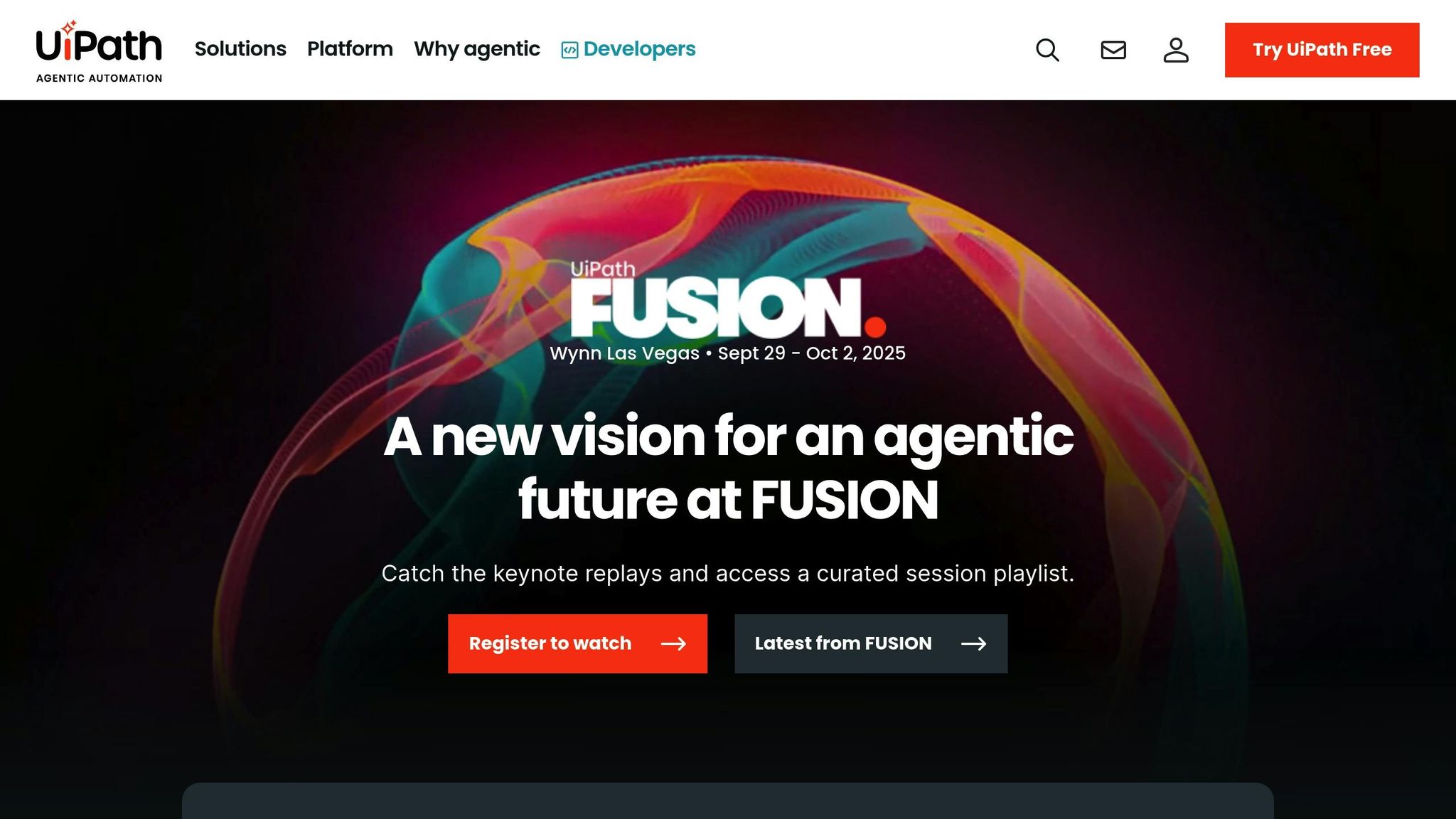
UiPath has established itself as a prominent player in robotic process automation (RPA), offering tools that reshape how businesses handle repetitive tasks and intricate workflows. Its platform excels at automating processes while ensuring adaptability and control across diverse enterprise environments.
UiPath's AI Center makes it easy to integrate various AI models and technologies. By supporting machine learning frameworks like TensorFlow, PyTorch, and Azure Machine Learning, the platform allows organizations to seamlessly use their existing AI investments.
One standout feature is its Document Understanding capability, which merges optical character recognition (OCR), natural language processing, and machine learning. This combination enables automated data extraction from documents such as invoices, contracts, and forms, regardless of their format or source system.
UiPath goes beyond model flexibility by offering extensive system integration options. Its robust connector library supports enterprise applications like SAP, Salesforce, Microsoft Office 365, and Oracle, enabling automation workflows to operate across multiple systems without the need for custom development.
The platform's API-first architecture is particularly useful for businesses with complex IT landscapes. It supports interactions with both modern web applications and older legacy systems through screen automation, ensuring that outdated technology doesn’t hinder digital transformation efforts.
At the heart of these integrations is the Orchestrator, a centralized management console that oversees automation performance across the organization. This centralized approach simplifies the management of multiple automated processes while providing visibility and control. It also reinforces governance and compliance throughout automation workflows.
UiPath prioritizes security and compliance with features like role-based access, detailed audit logging, and robot governance. Every automation action is tracked and recorded, creating a comprehensive compliance trail that meets regulatory standards in sectors such as healthcare, finance, and manufacturing.
The platform also includes Test Manager, which ensures the quality of automated processes through systematic testing. This feature helps businesses verify that their automations remain effective even as underlying systems evolve or update.
UiPath adopts a per-robot licensing model with tiered pricing based on the complexity of automation. Businesses can choose between attended robots, which work alongside humans, and unattended robots, which operate independently, depending on their specific needs.
To help organizations measure the effectiveness of their automation efforts, UiPath provides ROI tracking tools. These tools evaluate metrics like time saved, error reduction, and process completion rates, offering valuable insights into the return on automation investments and highlighting areas for growth.
For smaller-scale implementations, the Community Edition offers free access to core features, allowing businesses to experiment with automation concepts before committing to enterprise-level licenses.
Built with a cloud-native architecture, UiPath is designed to scale effortlessly, accommodating everything from small teams to global enterprises. The platform dynamically adjusts computing resources based on demand, ensuring reliable performance even during peak workloads.
With high-density robots, UiPath maximizes infrastructure efficiency by allowing multiple automation processes to run on a single machine. This setup reduces operational costs while scaling to meet growing automation needs.
Additionally, load balancing capabilities distribute automation tasks across available resources, preventing bottlenecks that could disrupt critical operations. This ensures that automation programs can expand alongside business demands without requiring major infrastructure changes.
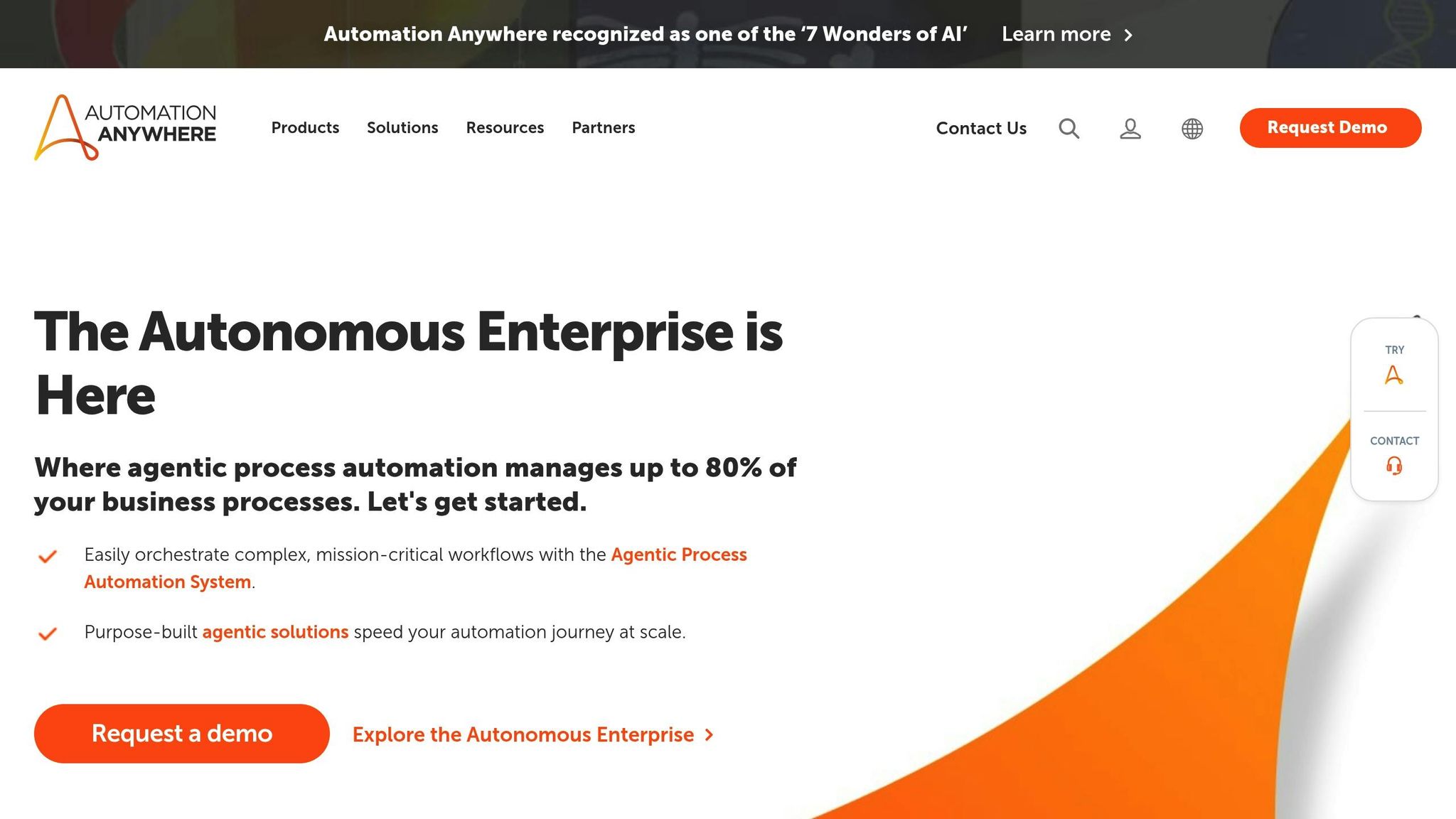
Automation Anywhere brings together robotic process automation (RPA) and artificial intelligence (AI) in a single platform designed to boost workplace efficiency. By simplifying repetitive tasks, this platform integrates seamlessly into existing workflows while maintaining strong security measures.
This platform incorporates various AI models to handle tasks such as document processing and data extraction. It does so without requiring major changes to existing systems, making implementation straightforward and efficient.
Automation Anywhere enables smooth connections between different systems, including web applications, desktop software, and older legacy platforms. A centralized management hub ensures these integrations work in harmony, streamlining automation efforts across the board.
With built-in security features, the platform adheres to industry standards and regulatory requirements. Secure access controls and detailed audit trails provide transparency and accountability, helping organizations maintain compliance with ease.
The subscription-based pricing model distinguishes between human-assisted and fully autonomous automation, offering clear cost visibility. Additionally, integrated analytics dashboards provide valuable insights into automation performance, helping businesses fine-tune their processes and measure return on investment effectively.
Its cloud-first design allows resources to scale automatically to meet changing automation needs. This elastic resource allocation ensures steady performance, even during peak activity periods, making it well-suited for the growing demands of automated workflows in 2025.

Relevance AI connects effortlessly with enterprise systems and third-party tools using pre-built connectors and APIs. It integrates with widely used applications such as CRM platforms, databases, cloud storage, and communication tools, creating smooth, organization-wide AI workflows.
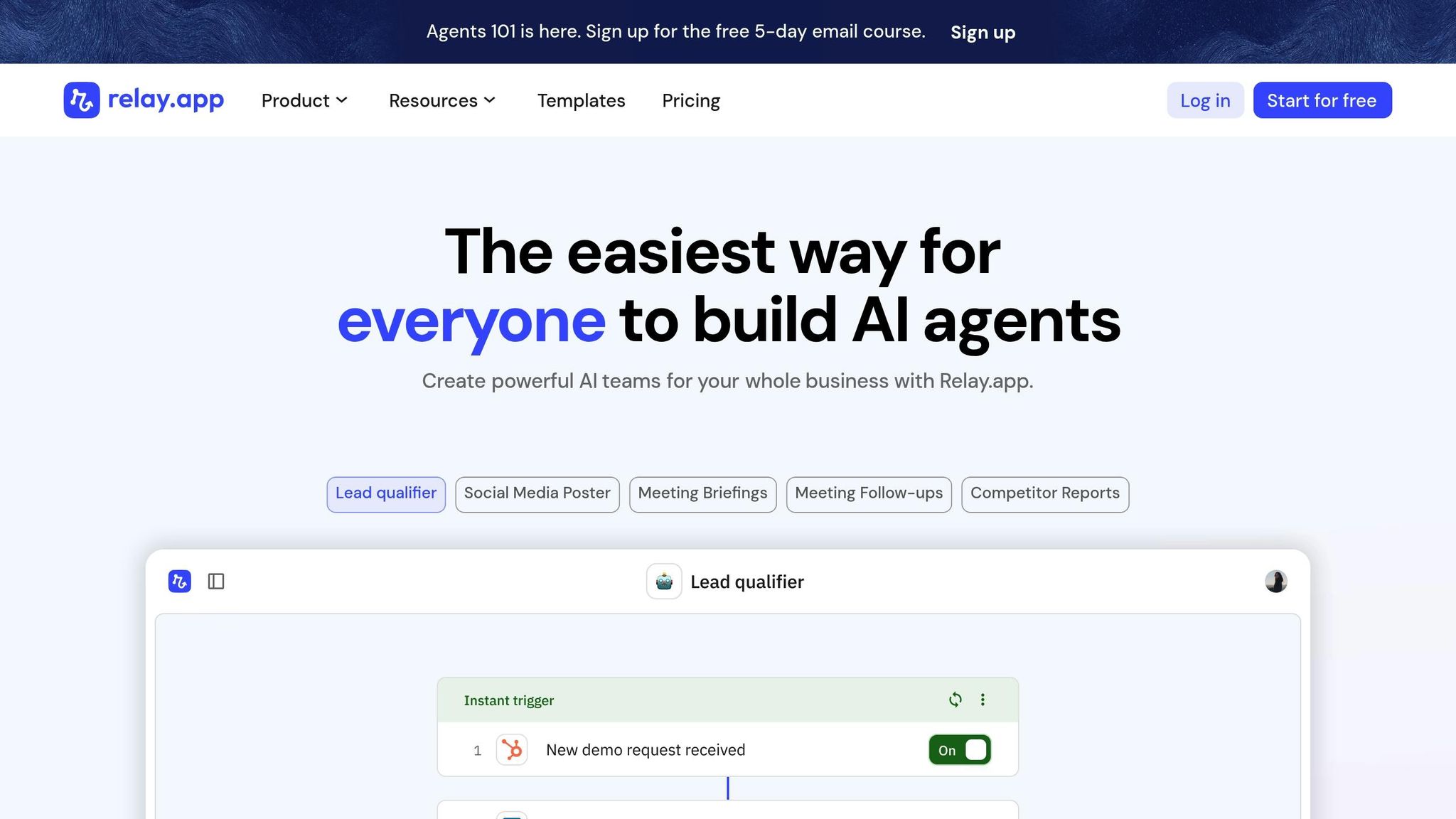
Relay.app stands out as a workflow automation platform that embeds AI into business processes, combining powerful AI capabilities with extensive integrations. By offering a flexible architecture, it enables teams to streamline operations and build AI-driven workflows without needing technical expertise. This makes advanced automation accessible to businesses of all sizes.
Relay.app shines in model interoperability, offering built-in AI tools for tasks like content summarization, text translation, and data extraction. It also supports custom AI prompts, allowing users to tailor AI functionality to meet specific business needs. This dual approach ensures that both beginners and advanced users can effectively integrate AI into their workflows.
The platform’s direct integration with OpenAI provides seamless access to leading language models, while its AI agents orchestrate multiple tools within workflows. This capability allows users to create multi-step processes that combine various AI functions into cohesive systems.
A practical example of this is Lucas Grey, who automated his waitlist management using Relay.app. He used GPT to analyze email replies and automatically saved the processed data into a Notion database.
"Used gpt in the workflow to parse the replies to our waitlist email qtns & saved them into our notion database." - Lucas Grey, @ImLucasGrey
This level of interoperability is further enhanced by Relay.app’s extensive integration capabilities.
Relay.app excels at integrating with over 100 popular business applications, including Airtable, Google Docs, Google Sheets, HubSpot, Notion, Salesforce, and Slack. These connections enable AI-powered automations to work directly with existing tools and data, ensuring workflows are both efficient and secure.
Rather than just moving data between systems, Relay.app focuses on embedding AI-driven automations into existing processes. This approach creates seamless workflows that bridge multiple applications while maintaining data integrity.
One standout feature is its human-in-the-loop functionality, which incorporates manual steps, approvals, and data entry within automated workflows. This ensures that human oversight remains critical, addressing concerns about AI replacing human judgment. Instead, Relay.app fosters collaboration, with AI handling repetitive tasks and humans focusing on strategic decisions.
For businesses with unique integration needs, Relay.app offers webhook support, enabling connections with virtually any external service or proprietary system. This flexibility ensures that even niche business environments can leverage AI-powered automation.
Relay.app is designed to grow with your business. Its combination of pre-built AI tools and custom prompts allows teams to start with simple workflows and gradually build more complex solutions as their needs evolve.
The platform’s AI agent functionality supports scalability by managing multiple AI tools simultaneously, enabling businesses to handle increasing workloads without requiring additional human oversight. These agents create comprehensive automation systems that adapt to growing demands.
Additionally, Relay.app’s expanding library of integrations allows organizations to scale incrementally. Teams can connect more applications and data sources over time without needing to overhaul their existing workflows. This incremental approach ensures that businesses can continue to derive value from their initial investments as they expand their operations.
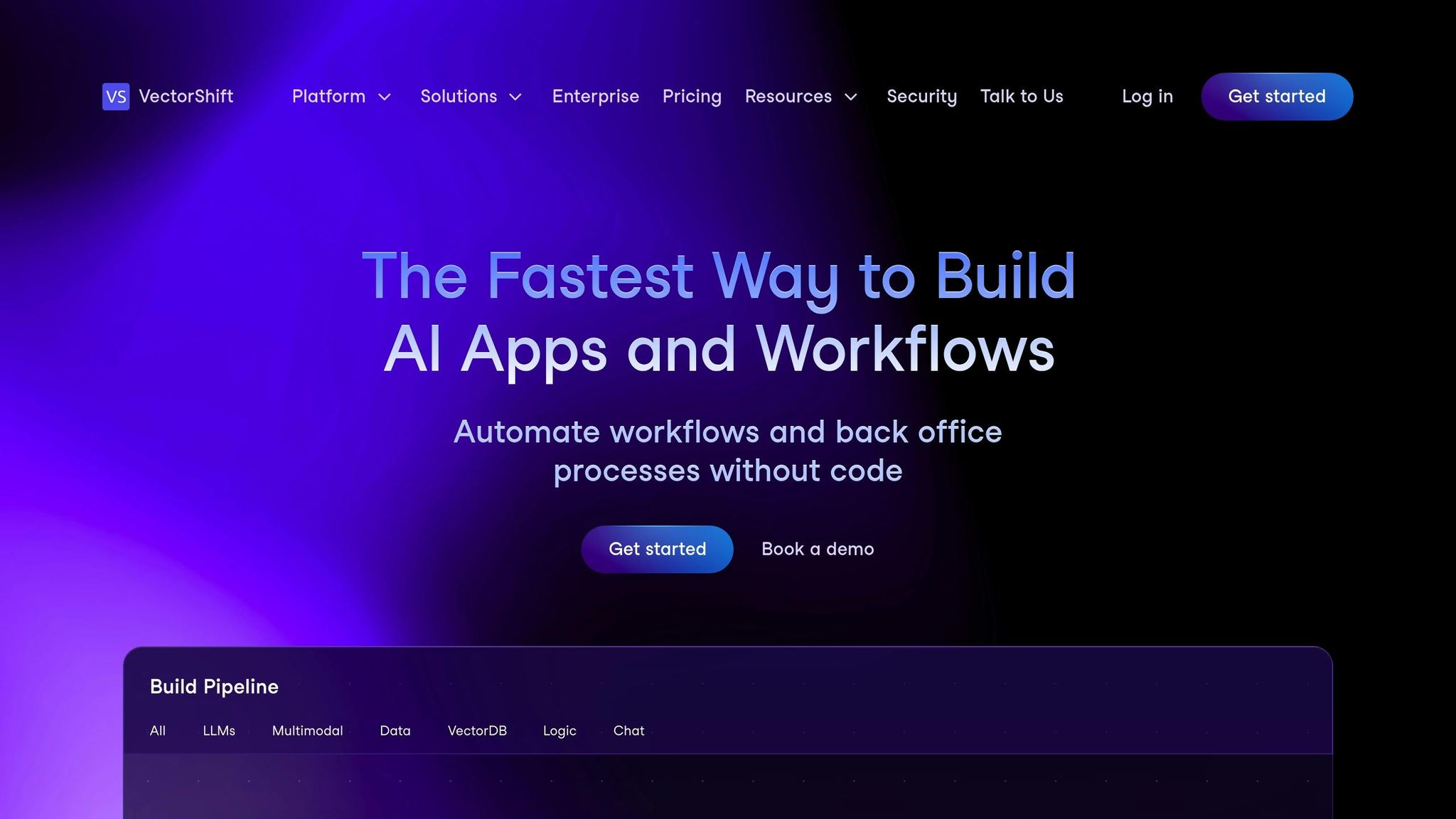
VectorShift is an advanced AI platform designed with enterprise-level security, compliance, and governance at its core. It’s particularly suited for organizations in regulated industries where safeguarding data is a top priority.
VectorShift incorporates LLM guardrails to enforce strict content policies and ensure regulatory compliance. Its PII protection filters work to identify and strip out personally identifiable information, keeping sensitive data secure.
The platform integrates seamlessly with existing business systems while maintaining strict governance standards. Role-based access controls ensure that only authorized personnel can access sensitive information, adding an extra layer of protection during implementation.
VectorShift sets itself apart by meeting rigorous standards, including SOC 2 Type II, HIPAA, and GDPR compliance. These certifications highlight its dedication to data security, availability, confidentiality, and privacy.
"At VectorShift, we commit to enterprise-grade security and compliance to ensure your data remains confidential."
The platform uses AES-256 encryption for data at rest and TLS 1.3 for data in transit, ensuring robust protection. It also enforces strict data usage policies through agreements with model providers, guaranteeing that customer data is never used to train AI models.
"VectorShift is fully committed to protecting your data and does not use it to train Artificial Intelligence models."
To address vulnerabilities, VectorShift conducts regular audits, penetration tests, and implements a comprehensive incident response plan. For organizations handling EU citizen data, it ensures compliance with GDPR by using binding standard data protection clauses under Article 46 and supports full data subject rights. This meticulous approach ensures data transfers to the U.S. are secure and compliant.
The platform’s architecture is designed to scale effortlessly, meeting the demands of growing enterprises without compromising on security or compliance.
VectorShift combines its robust security framework with the ability to scale efficiently for expanding workplace needs. Additional safeguards, such as extra encryption layers, need-to-know access protocols, and advanced monitoring systems, protect sensitive information as enterprises grow.
Organizational measures like regular employee security training, thorough background checks, and data minimization practices further bolster its security posture. Secure deletion protocols and detailed audit trails provide the transparency and control required for navigating complex regulatory environments. This ensures that as AI adoption increases, compliance and data security remain steadfast.
Each AI platform brings its own set of strengths and trade-offs, making it essential for organizations to evaluate their specific needs, budgets, and technical requirements. Here's a closer look at the defining attributes of these platforms:
Prompts.ai shines in cost transparency and model variety, offering access to over 35 leading language models through a single interface. Its pay-as-you-go TOKN credit system eliminates recurring subscription fees, potentially cutting AI costs by up to 98%. However, its focus on language models may limit its ability to address highly specialized automation needs.
Lindy.ai is tailored for natural language workflow creation, enabling users to design complex automations without coding. Its strengths lie in email management and scheduling, making it well-suited for routine tasks. However, it struggles with more intricate enterprise-level integrations that require extensive customization.
Domo excels in data visualization and business intelligence, turning raw data into actionable insights. It’s particularly effective at connecting diverse data sources across an organization. That said, its analytics focus may leave some teams wanting more in terms of comprehensive workflow automation.
UiPath is a leader in robotic process automation, offering strong enterprise support and extensive integration options. It’s highly effective at automating repetitive tasks across multiple applications. On the downside, its complexity often necessitates significant technical expertise and training for successful implementation.
Automation Anywhere is known for its robust bot development and security features. Its cloud-native architecture supports scalability for growing organizations. However, it can be resource-intensive, requiring a substantial initial investment in training and setup.
Relevance AI specializes in handling unstructured data, offering advanced machine learning capabilities for data analysis. It’s particularly strong in processing large volumes of text and document data. The main drawback is its steeper learning curve, which can be challenging for non-technical users.
Relay.app focuses on team collaboration and intuitive workflow design. It bridges human decision-making with automated processes, making it ideal for collaborative environments. However, it may lack the advanced AI capabilities needed for complex data processing tasks.
VectorShift prioritizes enterprise-grade security and compliance, making it a strong choice for regulated industries. With robust data protection and governance controls, it ensures high levels of security. However, its focus on security can make it less user-friendly for smaller teams with simpler needs.
The table below provides a side-by-side comparison of these platforms for better clarity:
| Platform | Model Interoperability | Integration Capabilities | Governance & Compliance | Cost Transparency | Scalability |
|---|---|---|---|---|---|
| Prompts.ai | Excellent (35+ models) | Strong API connectivity | Enterprise-level controls | Exceptional (pay-per-use) | High |
| Lindy.ai | Limited to core models | Good for common apps | Basic compliance features | Moderate transparency | Medium |
| Domo | Analytics-focused | Extensive data connectors | Strong data governance | Subscription-based | High |
| UiPath | RPA-focused models | Enterprise-level | Enterprise compliance | Complex pricing | Very High |
| Automation Anywhere | Bot-specific AI | Wide application support | Strong security features | Tiered pricing | High |
| Relevance AI | ML model flexibility | API-first approach | Standard compliance | Usage-based pricing | Medium |
| Relay.app | Basic AI integration | Team-focused connectors | Workflow governance | Transparent pricing | Medium |
| VectorShift | Enterprise LLM support | Secure integrations | SOC 2, HIPAA | Enterprise pricing | Very High |
This comparison highlights the importance of balancing priorities such as cost efficiency, technical complexity, and specific use cases. Platforms like Prompts.ai are ideal for teams focusing on language model applications, while tools like UiPath excel in automating complex processes. Ultimately, the best choice depends on whether an organization values broad AI access, targeted automation capabilities, or strict compliance requirements. These factors play a key role in driving productivity and informed decision-making in today’s fast-paced workplace.
The workplace in 2025 has undergone a profound transformation, with AI platforms now forming a critical backbone for many organizations. Companies that have embraced these tools are seeing measurable improvements in productivity, cost efficiency, and employee satisfaction.
When considering AI platforms, it’s crucial to assess how well they align with your business goals. Not every solution will fit every need, so evaluating platforms based on their specific strengths is key. For businesses with more intricate automation requirements, Robotic Process Automation (RPA) tools can address complex workflows effectively.
Scalability remains a cornerstone of long-term success. Look for platforms that can grow alongside your organization, accommodating new models, users, and integrations without disrupting your existing processes. As discussed earlier, some platforms are built for large-scale operations, while others cater to nimble, collaborative teams.
In 2025, security and compliance are non-negotiable. Platforms offering strong governance features, comprehensive audit trails, and robust data protection are especially critical for industries with strict regulatory requirements.
The return on investment (ROI) for AI platforms goes beyond simple cost reductions. Benefits like accelerated training, faster decision-making, and enhanced employee engagement play a significant role. The most impactful implementations deliver not just immediate gains in efficiency but also long-term strategic value, such as improved data insights and streamlined operations.
As AI platforms evolve, choosing solutions with strong model interoperability and active developer communities ensures your organization remains adaptable. A unified interface that supports multiple AI models allows businesses to stay agile and adjust to shifting demands without overhauling their infrastructure.
Ultimately, success in 2025 hinges on approaching AI platform selection as a strategic decision. Focus on how the platform aligns with your business objectives rather than simply ticking off a list of features. This thoughtful approach can pave the way for sustainable growth and innovation.
To select the best AI platform for your business, begin by pinpointing your specific objectives - whether that's boosting productivity, automating routine tasks, or extracting more meaningful insights from your data. Prioritize platforms that include features such as workflow automation, data analysis, and integration capabilities with your current tools.
Assess how well the platform fits your operational requirements and whether it can adapt as your business expands. Ease of use, robust support options, and customizable features are also key factors to consider. Taking advantage of demos or trial periods can give you a hands-on understanding of the platform’s practicality and how effectively it meets your needs.
To maintain data security and adhere to compliance standards, businesses need to focus on robust encryption methods, enforce stringent access controls, and keep a close watch on their systems for any signs of breaches. Staying proactive by frequently updating security protocols is key to countering new and evolving threats.
In addition, organizations must align with privacy laws like GDPR and CCPA by conducting regular audits and taking steps to prevent bias or improper handling of sensitive data. These practices not only protect valuable information but also uphold trust and ensure adherence to both legal and ethical responsibilities.
Prompts.ai offers a pay-as-you-go TOKN credit system, removing the burden of expensive upfront subscriptions. With this approach, businesses only pay for what they actually use, making it a cost-effective solution for companies, no matter their size or budget.
By 2025, improvements in AI technology have made platforms like Prompts.ai more streamlined, cutting down on hardware and operational expenses. This means businesses can boost productivity while keeping costs under control, delivering a strong return on investment.


